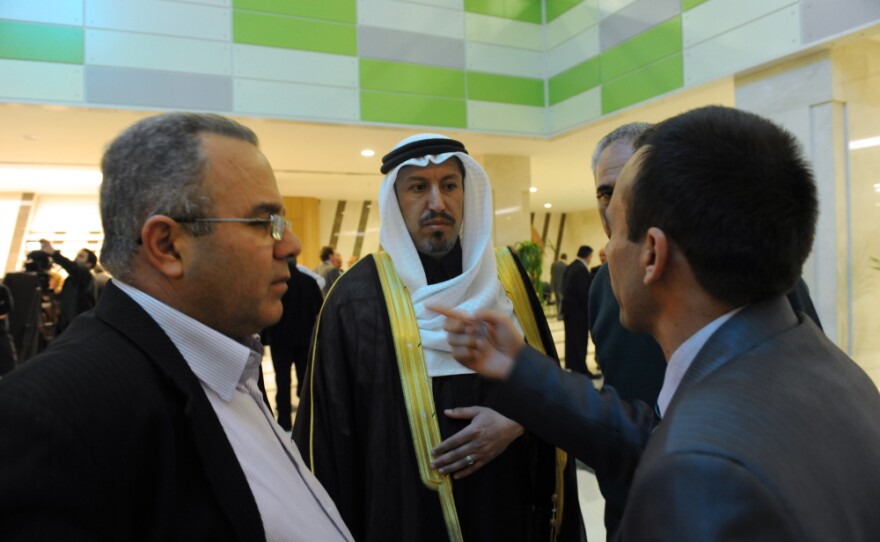U.N. special envoy Kofi Annan says the Syrian government should be the first to enact a cease-fire, but there was no sign of that on Friday. More violence erupted in several Syrian cities as diplomats prepared for Sunday's meeting of the "Friends of Syria" in Istanbul, Turkey.
The gathering comes at a time of growing disaffection with diplomatic efforts and an increase in attacks by Syrian opposition fighters.
One reason for the gloomy diplomatic outlook at the moment is that it's taking far too long in the eyes of some to transform the opposition Syrian National Council from an umbrella group of very disparate factions into a functioning political organization.
As Syrian National Council members gathered in Istanbul this week, there were vigorous efforts to rebut the primary criticisms of the council. Those criticisms include charges that the body is too opaque and undemocratic itself, and that the Syrian Muslim Brotherhood has too powerful a role, raising fears of a Sunni Islamist agenda surfacing later on.
Muslim Brotherhood Offers Its Plan
The Syrians play hardball. When [former Egyptian leader] Hosni Mubarak was threatened, he sent a bunch of violent camel drivers into Tahrir Square. When Assad was threatened, he sent thousands of tanks against his own cities. So, you know, the Egyptians play wiffle ball, but the Syrians play hardball.
The Muslim Brotherhood laid out a point-by-point explanation of its vision for a pious but tolerant and pluralistic Syria. One member of the brotherhood, Mohammed Riad Al-Shaqfa, was at pains to portray the Syrian Muslim Brotherhood as much closer to Tunisia's moderate Islamists, and far from the hard-line Salafists of Egypt, Saudi Arabia or Yemen.
"We don't want to impose anything on anyone," Shaqfa says. "If a woman comes to visit Syria and we are in charge, she won't have to wear a veil if she doesn't want to."
He also called on the Syrian army to stick to defending civilians, but reports from inside Syria suggest that opposition attacks on the army are growing in number and aggressiveness. Several Syrian army officers have been assassinated in recent days, and opposition Web reports have begun including such killings and other attacks in their daily accounts from the field.
Such developments lend all the more urgency to what opposition member Mohammed Sarmini calls "opposition unity," not among every faction, but on the top priorities.
"What's important now is not unifying the entire opposition, but to agree on a single road map that will one, bring down the regime and two, set up discussions on Syria's future," Sarmini says.
No Sign Of Cease-Fire From Syrian Government
For now, Syrian President Bashar Assad seems to be ignoring Annan's call for government forces to be the first to implement a cease-fire.
Analyst Rami Khouri at the Issam Fares Institute for Public Policy in Beirut, Lebanon, says the Syrian government's position seems to be to buy time and hope the conflict shifts to a political process that it can manage without losing power. In his view, that's unlikely.
"I don't think that's realistic at all," Khouri says. "I think if they do transform the current confrontation into, say, a political dialogue one, which Kofi Annan's plan wants to happen, this probably will spell the end of the regime through peaceful demonstrations and elections."
Khouri says with Iran and Russia providing weapons and political cover for the regime in Damascus, the opposition may continue to face a harsh military response by Syria's security forces.
"The Syrians play hardball," Khouri says. "When [former Egyptian leader] Hosni Mubarak was threatened, he sent a bunch of violent camel drivers into Tahrir Square. When Assad was threatened, he sent thousands of tanks against his own cities. So, you know, the Egyptians play wiffle ball, but the Syrians play hardball."
Copyright 2022 NPR. To see more, visit https://www.npr.org. 9(MDAzMjM2NDYzMDEyMzc1Njk5NjAxNzY3OQ001))







